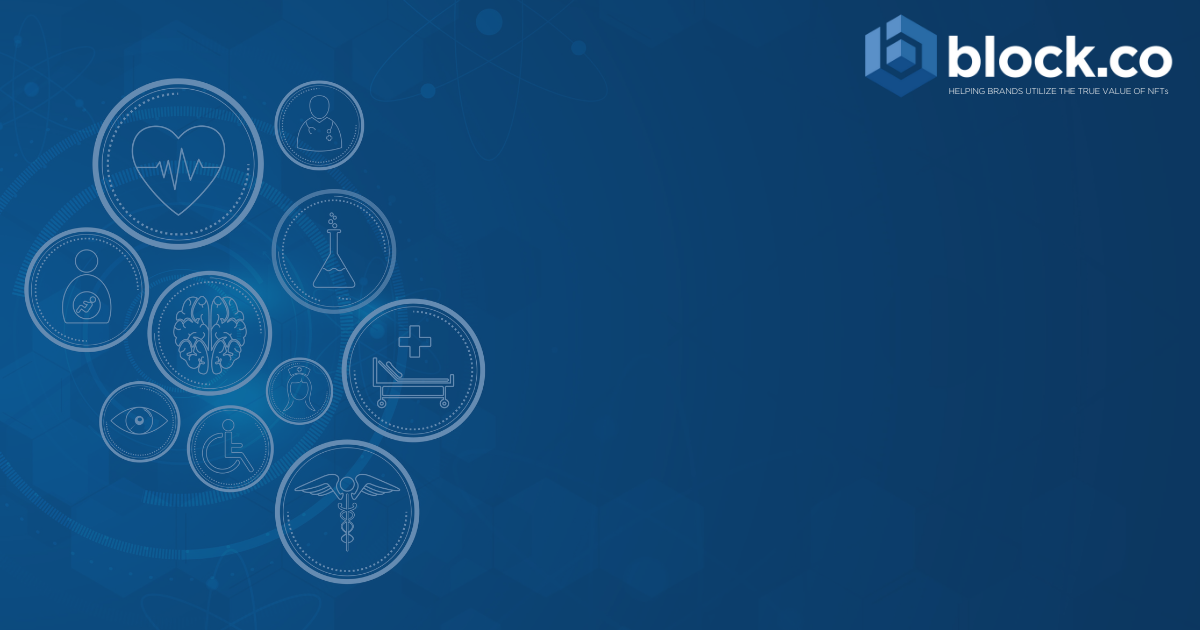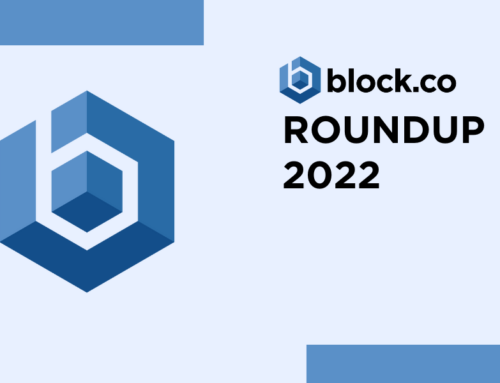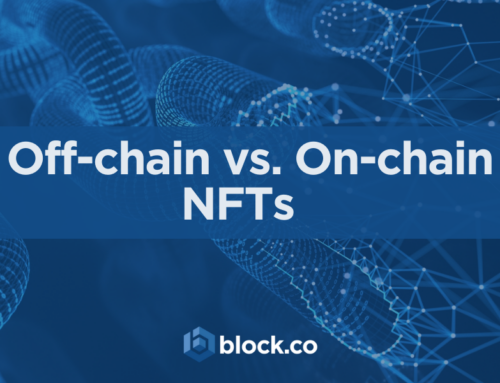Blockchain in Healthcare: Bridging Trust in Response to COVID-19

There’s never been a better time to provide proof-of-health solutions in the healthcare system globally. While it’s difficult to comprehend the significance of the role that technology may offer in such difficult times, essentially it can be nailed down to its basic concept of simplifying work and coordinating activities, which could have helped avoid the worst crisis people have experienced in their lifetime. If the healthcare system would adopt technological innovations in the early stages, it could have benefited and saved many lives.
Although the healthcare system has traditionally been slow in embracing the latest digital solutions, just like many other industries, we’ve observed in a previous article how the Covid-19 crisis has accelerated the adoption of digital technologies on a global scale in several industries, including healthcare.
The latest webcast brought to the audience by Block.co hosted some high profile experts from the industry. They illustrated how blockchain especially, together with other technologies such as IoT, and AI could in the future help elevate prompt responses, and provide more secure and efficient storage of data, something that has been missed in the recent pandemic.
Ahmed Abdulla from Digipharm, Dr. Alice Loveys from EY, and Dimitrios Neocleous from VeChain were hosted by Georgina Kyriakoudes, one of the first in the world to hold an MSc in Digital Currency, founder of Dcentric.Health and creator of the permissioned blockchain ecosystem app called Aria, which aims to transform the patient healthcare experience by giving individuals full control of their medical records.
Blockchain’s benefits in healthcare are primarily identified by efficiency, specifically on the transfer of data, facilitation of goods transport via the supply chain, prevention of counterfeit medicines sale, secure storage, and exchange of data around ID management. The impressive projects all the webcast guests have developed in the industry enable just these features, from the digitization of patient records to storage and exchange of medical data as well as easier processing of funds.
Ahmed Abdulla founded Digipharm with the idea of issuing tokens to allow patients to be in control of their medical records at all times. Moreover, tokens are issued to be paid for anonymously sharing personal medical data to help research; pay for healthcare based on how it has improved quality of life.
“We have experienced a disparity in Covid-19 tests costs around the world. For instance, getting tested in Cyprus costs around €60 while in the US it may add up to a few thousand dollars. This is due to the way countries arrange payment setups from payers to providers. Blockchain empowers people to take ownership of their records and funds while providing transparency of processes. This is where blockchain can be robust, by increasing transparency and allowing the patient to secure money transfer and hold their own records”, stated Ahmed.
His work as blockchain advisor at the UN Economic Commission for Europe is helping set up standards for the blockchain ecosystem, namely how the system should be used safely, and in a way that benefits all stakeholders.
“I lead the blockchain and healthcare team at the UN center for trade facilitation and e-business where we developed a blockchain and trade facilitation white paper; the second phase will soon provide an advanced technology advisory board to advise private or public stakeholders on what’s the best technology to use. It might not always be blockchain, hence we first understand and then advise if the tech is right for them or not. Blockchain is clunky, expensive, and not always proper for the organization we work with”, continued the blockchain expert.
Most people may prefer public and permissionless blockchain because it has major advantages over a private and permissioned one. Transparency stands out for the way the ledger is shared and for due diligence becoming unnecessary as a result. This means costs are also cheaper, in the range of 100% lower. On the other hand, a public decentralized blockchain has a major disadvantage since no legal framework is laid out. This means uncertainty as there is still a grey area in the legal field that might create confusion.
Dimitrios Neocleous is Ecosystem Manager at VeChain Tech and directly supported digital and technological solutions provider I-DANTE with the creation of the E-NewHealthLife and the E-HCert for the Mediterranean Hospital of Cyprus. Both apps give patients control over their health records, improve medical data sharing, and increase hospital operational efficiencies by simplifying the process of visiting a hospital.
E-NewHealthLife is a complex ecosystem solution that starts from a patient’s visit to an emergency room. A card with the reason for a patient’s visit is issued; it gets time-stamped; the patient is sent to the waiting room; once the patient’s turn comes and the medical check is completed, the card is scanned and the visit is closed. Patients can digitally access all diagnoses that took place anytime at the hospital.
“The platform produces a digital health passport, which is an encrypted non-fungible card that patients can use to identify themselves automatically when registering at the hospital’s emergency room. The passport is stored within a mobile app called E-HCert, which keeps track of each patient’s medical data and can be shared as needed”, announced Dimitrios.
E-HCert App is a Covid-19 lab test electronic wallet and pushes up the results of a patient who’s been tested for COVID. It has been proven to be very successful so far; currently, 2000 people who transited through the Larnaca airport in Cyprus have downloaded the app. With time-stamped records, it’s able to provide data such as the day and time when the sample was collected, it offers immutability, security, and integrity of data.
“Covid-19 showed a deficiency in healthcare. The spread of the virus could have been prevented if we had digitization of processes and transparency of data through blockchain, and transfer of data through an authorized share of records. An open permissionless decentralized blockchain helps bring ownership of medical records back to the patient, and that is not possible in a centralized system”, continued the VeChain representative.
Dr. Alice Loveys is EY ‘s healthcare blockchain leader in the US and has been at the forefront of emerging healthcare technologies for her entire career including being a pioneer in electronic health record adoption, health information exchange, and privacy and security.
She believes that “blockchain technology is like a plumbing system that brings clean and transparent trusted data that can be used. It’s not proper for a track and trace system as it invades privacy unless there is the consent from patients, in that case, blockchain transparent share of data would be extremely useful for medical research and testing”.
One problem we experienced during the crisis is the confusion that arose with divulged information and the frustration that comes with it. People do not understand anymore which information can be trusted; at first, it looked like COVID-19 symptoms were not dangerous, then it came out that they actually were. Masks were not useful at the beginning, then they suddenly became necessary.
“Blockchain could have prevented lockdown and economic crisis through data management in that a much faster response would have been provided to tackle misinformation because blockchain can help manage data from different sources”, continues Dr. Loveys. “Moreover, it’s a great way to protect the database. Instead of moving any private sensitive medical data through the more traditional digital systems, blockchain simply allows us to send an algorithm, encrypted data that safeguards the information. It’s not a great use as a database as it does not scale, therefore we would not be able to store information for billions of people in it. But for the data that is in the blockchain, using algorithms, makes it very convenient and secure”.
Another topic discussed during the webcast was the GDPR compliance for blockchain. GDPR (General Data Protection Regulation) was created before blockchain therefore it doesn’t account for decentralized technologies. Generally speaking, it all comes down to how the technology is used and what kind of data is incorporated in it. Timestamping data without invading anyone’s privacy, or timestamp of consented data, should determine no issue at all. This is what privacy by design stands for, taking human values into account in a well-defined manner throughout the whole process.
Block.co, powered by the University of Nicosia, is establishing itself as a global leader in the issuance of digital immutable and secure certificates timestamped on the Bitcoin blockchain. In the field of healthcare, it could include medical records, prescription issuance, insurance disputes, supply chain documentation, and any type of verifiable certificate that requires authenticity at its core.
If your brand is ready to take the step into web 3.0 and NFT marketing, to optimize engagement with your audience in innovative ways, then click the button below to get your Free Trial, a limited number of Free NFTs, and a Free Consultation call from our team!
For more info, contact Block.co directly or email at enquiries@block.co.
Tel +357 70007828
Get the latest from Block.co, like and follow us on social media:







